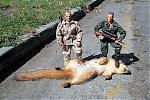Islamic eschatology knows ten signs which portend the Last Day, the so-called 'signs of the Hour'. They are:
the coming out of the descendants of Asfar
the coming of the Mahdi [Sunni & Shia differ on his identity/role]
the coming of the dajjal [a figure in Islamic theology homologous with Christianity’s Antichrist]
the descent of 'Isa b. Maryam [Jesus]
the rising of the sun in the West
the coming forth of Gog and Magog
the beast coming out of the earth
the assumption of the Koran into heaven
the smoke
the burning of fire from Yemen, or, the subsiding of the earth. [p.78]
In Arabic sources the name Turk is often said to derive from turika "to be left behind", the passive form of taraka. Originally, it is said, Gog and Magog were 24 or 22 peoples, or, according to Wahb b. Munabbih and Muqatil b. Sulayman 21 peoples. When 'the two-horned one' locked them up behind the barrier, one people were lift behind (turika) because they were absent on a raid, or, according to a less anti-turkish approach, they were left out because they believed in God. On the authority of al-Suddi, Ibn Mardawayh reports that the Turks are a contingent of Gog and Magog who broke out alternately. They had gone out on a raid andthus remained 'on this (i.e. the Arab) side' of the barrier. [p. 83-4]
Mirkhwand and Khwandamir apparently also reckon Gog and Magog among the human beings. They both remark that one of their abominable customs is to devour the body of someone who dies among them. On the other hand, they also write that Gog and Magog cannot be considered as human beings for they have neither law nor religion, do know neither God nor man, and live like animals. For Ibn Khaldun, Gog and Magog are not only human beings, they are also “white”:
The inhabitants of the North are not called by their colour, because the people who established the conventional meanings of words [to them] were themselves white. Therefore the inhabitants of the North, the Turks, the Slavs, the Toghuzghuz, the Khazars, the Alans, most of the Western Christians, Gog and Magog, are found to be separate
nations and numerous races called by a variety of names. [p. 108]







Bookmarks